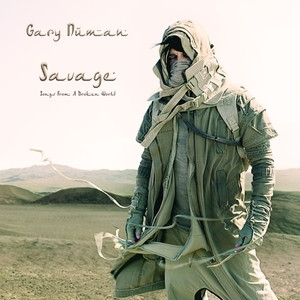Gary Numan - Savage (Songs From a Broken World)
Twenty-one albums in and Numan keeps finding way to refresh and evolve his sound. Trading in the decayed Victorian and broken machines aesthetic of Splinter (Songs from a Broken Mind), Savage (Songs from a Broken World) brokers in Middle Eastern sounds. This is not the sound of a sheik’s palace situated in a lush oasis. Rather, it is the transmission of a solitary nomad working with pieces of ruins and scattered fragments—the litter of the first world. The effect is a sweeping, cinematic feel of desert winds blowing over lonely dunes in the middle of nowhere. Numan should dig deeper into the sands at some future point.
Opener 'Ghost Nation' is a paranoid, anxious track with edgy guitars and elongated rhythms setting the tone for what is to come. “We live in a windswept hell / Where dust and death are neighbors” the first two lines announce. The setting for Savage may be a warzone, a post-apocalyptic wasteland, or a disaster area. Vocal wails and skittering electronic blips push forward 'Bed of Thorns.' 'My Name is Ruin' moves the energy up a few notches and is the album’s best example of the dance beats, guitars, and Middle Eastern vocal phrasings cohering and complementing one another. 'The End of Things' starts slow and builds urgently. 'It All Began With You' is a tender pledge from the singer to his beloved. Numan takes a great risk in writing and performing such a song, but the vulnerability works. 'When the World Comes Apart' picks the pace up.
After finishing Savage, one finds connections between it and Splinter. 'Splinter' from Splinter has a Middle Eastern sound. 'My Name is Ruin' from Savage shares the same or a very close synth riff with 'Love Hurt Bleed' from Splinter. The two albums feel as if they could be halves of a double album.
In the great deserts, one must learn to survive on very little. Supplies are always running short. Much of Savage displays a minimalist, almost survivalist element, as if every movement, gesture, and note must be conserved and used for maximum effect. For example, in the sparse chorus of 'What God Intended' Numan relies on a single “oh,” that stretches out, raises, and then lowers.
In many places the vocals drop out and just the instruments remain. Songs begin and run for several minutes before the vocals appear. For example, no vocal sounds show up in 'Broken' until well after the two minute mark and there are no words until nearly four minutes in. Thus, the vocals are often just another instrument or layer rather than the centerpiece of the song. The reduction of vocals increases the feeling of emptiness in the songs.
There is a sense, especially near the back end of the album, of waiting for a track to punch through. There are fast tracks spread throughout the album, but it’s not a matter of speed so much as of weight. Savage as a whole feels lighter than Splinter. Some of this may be due to the absence of Robert Finck of Nine Inch Nails and Tim Muddiman who each played guitar on multiple Splinter tracks along with mainstay Steve Harris. Sometimes a light touch is needed, but in this case, a heavier hand or additional guitar lines might have helped anchor the tracks and given them more weight. Some songs feel as though at any moment they might float away or dissolve into light and ash. Additionally, although Ade Fenton handled the programming for both records, the drums of Splinter feel more organic versus the synthetic sounding percussion of Savage.
These tracks are tracts of loneliness, creating a sense of space and vastness, timelessness. Numan looks over a lonely empire. As he reflects in 'Mercy', “we are quite alone.”
Sep 23 2017
Share this review
Facebook
Twitter
Google+
Shares
Buy this release
We don't have any stores registered for this release. Click here to search on GoogleGary Numan - Telekon is available at POPONAUT from 12,95€
Related articles
Tyler Milchmann - 'Die Leiden'
Review, Apr 14 2015
Daybehavior - 'Follow That Car!'
Review, Oct 12 2012
Lucifer's Aid - 'New To Reality'
Review, Aug 22 2016
Philipp Kessler - 'Pulsar'
Review, Jul 27 2017
NAILBREAKER - 'SPECTRUM SONGS'
Review, Mar 25 2020




